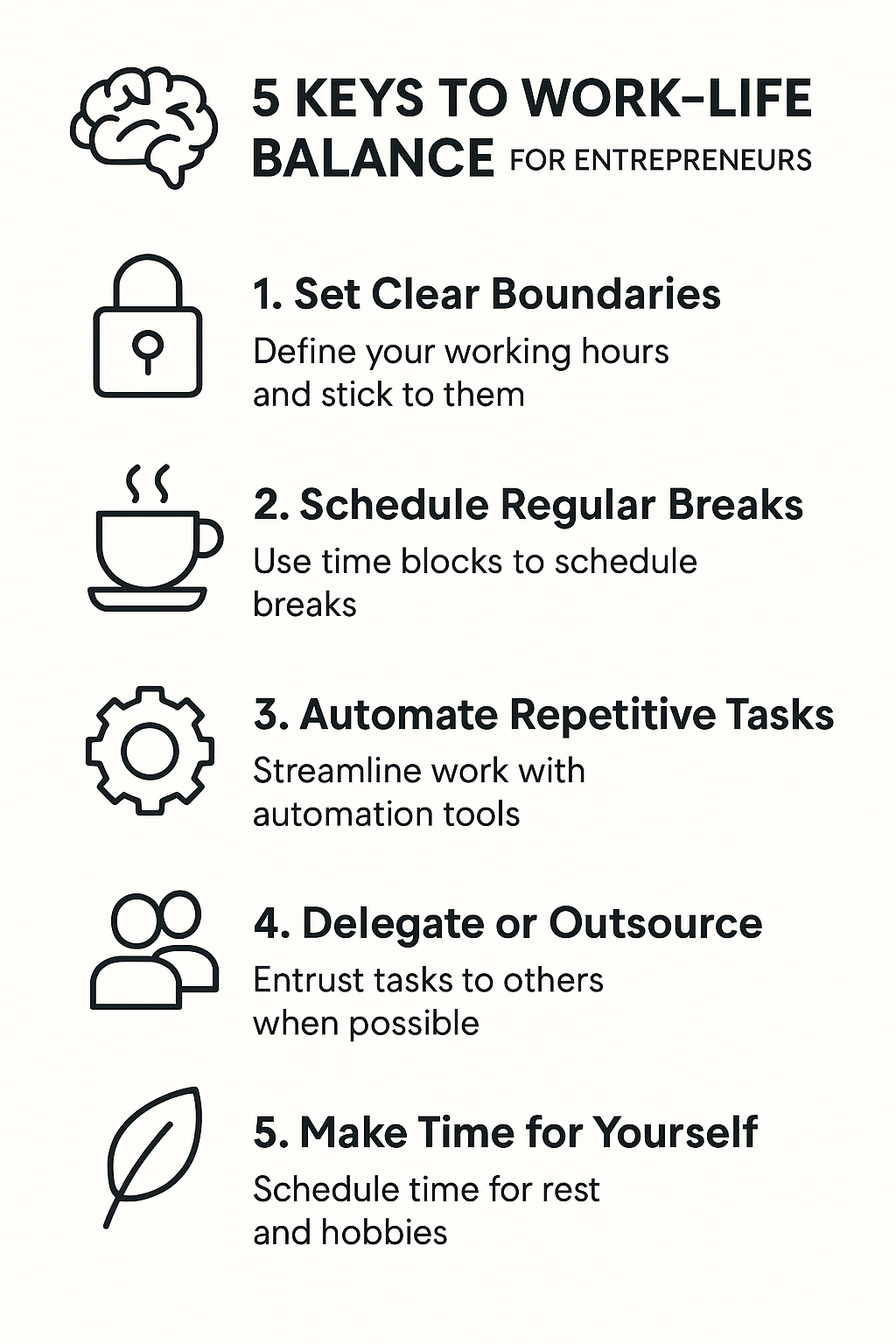Running your own business is a beautiful, chaotic thing. You’re the boss, the visionary, the customer service rep, the accountant, and maybe even the janitor. But when your to-do list starts eating into your downtime — or your sleep — it’s time to reassess. Because building your dream shouldn’t come at the cost of your well-being. Let’s talk about what work-life balance really means when you’re your own boss, and how to actually achieve it.
Why Work-Life Balance Matters (Especially for Entrepreneurs)
Work-life balance isn’t about clocking out at 5 p.m. with military precision. It’s about creating a sustainable rhythm where your business thrives — and so do you. Entrepreneurs are especially vulnerable to burnout because the line between "work" and "life" can blur fast when you're passionate (or panicked) about your goals.
A solid balance means:
- Better mental health: Chronic stress erodes creativity, focus, and decision-making.
- Stronger relationships: You didn’t start a business just to ignore your family and friends.
- Long-term success: Burnout is the fastest way to stall your momentum.
And beyond these essentials, balance makes room for inspiration, joy, and the kind of presence that builds a brand people actually trust. A balanced entrepreneur can lead with clarity, not chaos.
Signs You Might Be Out of Balance
Sometimes, imbalance sneaks up on you. Other times, it crashes in like a caffeine-fueled raccoon. Watch out for these red flags:
- You’re always working — even on “days off.”
- You feel guilty resting, even when you’re exhausted.
- Your health is taking a hit, with more headaches, poor sleep, or burnout.
- You’ve lost touch with hobbies, friends, or that elusive thing called fun.
- Everything feels urgent, and you never feel caught up.
- You’re short-tempered or emotionally flat — like you're running on empty.
Recognizing these signs early can save you from spiraling into full-blown burnout. Awareness is your first tool — and one of the most powerful.

How to Reclaim Your Time (Without Sacrificing Growth)
Balancing business and life isn’t about doing less. It’s about doing smarter. These strategies can help you reclaim your time and protect your energy:
1. Set Boundaries Like a Boss
Decide your working hours and stick to them. Your inbox doesn’t need you at 11 p.m. Boundaries also mean letting clients know when you’re available — and when you’re not.
Consider using a scheduling tool like Calendly to avoid back-and-forth and set clear expectations. Block off weekends or evenings. Create an auto-responder that reinforces your work hours. Remember: boundaries are less about restriction and more about protection.
2. Schedule Real Breaks
Put actual rest time in your calendar. No, scrolling Instagram doesn’t count. Go outside. Take a nap. Move your body. Unplugging is not a luxury — it’s maintenance.
Try using the Pomodoro Technique — 25 minutes of focused work followed by a 5-minute break. Or commit to a real lunch break every day. Breaks reset your nervous system and boost productivity, not hinder it.
3. Automate and Delegate
Use tools that take tasks off your plate — from email automation to website builders to managed hosting. Hire help when you can. You’re not supposed to do it all.
Automation ideas:
- Email sequences for onboarding clients
- Social media scheduling tools
- E-commerce order confirmations
Delegation isn’t failure — it’s leadership. Whether it’s hiring a virtual assistant or using a bookkeeping app, every hour you save is time you can reinvest in high-impact work or actual rest.
4. Create a “Stop Doing” List
Not every task deserves your energy. Identify what drains you and see if it can be cut, outsourced, or restructured. Your time is your most valuable resource.
Ask yourself:
- Is this task generating revenue or building relationships?
- Could someone else do this better or faster?
- Am I doing this out of habit or actual necessity?
Sometimes, saying no is the most productive thing you can do.
5. Anchor Your Day With Routines
Morning routines, work blocks, evening wind-downs — they help signal when it’s time to focus and when it’s time to rest. Habits create flow and reduce decision fatigue.
Consider:
- Starting your day tech-free for the first 30 minutes
- Having a dedicated space for work vs. rest
- Ending your workday with a shutdown ritual (journaling, planning tomorrow, closing your laptop)
Mental Health Tips for Entrepreneurs
Your business can't thrive if you're running on fumes. Alongside time management, your mindset and emotional resilience are just as important. Here are some ways to protect your mental health:
- Therapy or coaching: Regular check-ins with a professional can help you manage stress and stay grounded.
- Community support: Join entrepreneurial communities, masterminds, or co-working spaces. Isolation fuels burnout.
- Gratitude practice: Write down 3 wins daily — even small ones. It helps shift focus from hustle to progress.
- Unplugged time: Designate tech-free hours, especially before bed. Sleep is sacred.
Being mentally well isn't just good for you — it's a competitive advantage.
Real-Life Balance Examples from Entrepreneurs
Let’s ground this in reality. Here’s how real entrepreneurs create work-life balance:
- Tara, a freelance graphic designer, stops taking client calls after 4 p.m. and schedules all admin work for Friday mornings. Her afternoons are for creativity — or rest.
- Marcus, who runs an e-commerce brand, automates 80% of customer support with a chatbot, freeing up his weekends to coach his kid’s soccer team.
- Lina, a wellness coach, batch-creates all social media content once a month. She uninstalls Instagram during off-weeks.
There’s no one-size-fits-all. The key is experimenting, observing, and adjusting.
Tools That Can Lighten Your Load
Rebel.com is all about helping you spend less time managing tech and more time building your dream (or enjoying your day off). Here are a few tools that make it easier:
- Professional Email: Keeps your biz looking sharp and organized.
- Domain Privacy Protection: Keeps your personal info safe — no more spam calls.
- Free Hosting Migration: Switch platforms without the stress.
- SSL Certificates: Boost trust and security without lifting a finger.
- WordPress Hosting: Focus on your content, not your code.
- Domain Search Tool: Get your dream name, hassle-free.
Smart systems are like invisible assistants. They do the work while you breathe.
Final Thoughts: Make Balance Your Business Strategy
Work-life balance isn’t a “soft skill” — it’s a power move. It’s how you build a business that doesn’t just survive but supports your actual life. It’s how you show up for your clients with energy. It’s how you lead with vision instead of exhaustion.
And remember: balance looks different in different seasons. Launching a new product? You might hustle more. Just wrapped a big project? Take a lighter week. The goal isn’t perfection — it’s sustainability.
You’re building something bold. And you deserve to enjoy it.

























